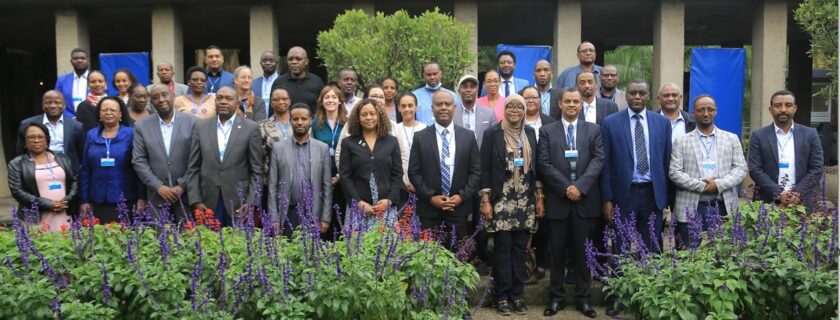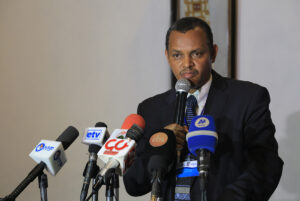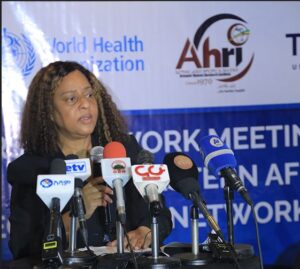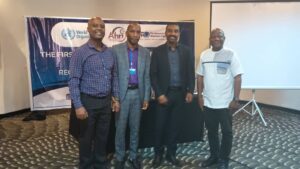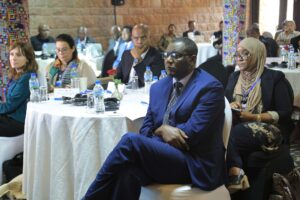Inspired by Tuberculosis Research Advisory Council (TRAC) and hosted by the Armauer Hansen Research Institute (AHRI), the 1st meeting of Southern and East African Regional Network for Tuberculosis (SEARN-TB) was held in Addis Ababa. The network aims to strengthen coordination and harmonization of TB control approaches with a particular focus on promoting implementation and operational research and the efficient use of research outcomes to strengthen TB control throughout the region.
Prof. Afework Kassu, Director general of AHRI and Chair Person of TRAC, on the occasion shared AHRI’s experience in TB research over the past couple of decades. The director general said AHRI has conducted various researches on Tuberculosis and published on popular journals. He also highlighted TRAC’s contribution in the National TB program of Ethiopia and the major achievements made so far.
Prof. Afework said the challenges in TB programs of different countries are the same. This is an opportunity to work on the common problems, and “justify why we are together” as SEARN-TB, the general director added.
NTP Managers, TB Coordinators, and other communicable disease managers joined from Ethiopia, Djibouti, Somalia, Somaliland, Uganda, South Africa, Namibia, Zambia, Lesotho, Seychelles, Comoros, Mozambique, Eswatini, Botswana, Malawi, and Madagascar and shared Epidemiological Context, Challenges, and Program Specific TB issues of each participating country.
The network is supported by the Special Programme for Research and Training in Tropical Research (TDR) at WHO in collaboration with the Global TB department of the WHO (GTB), the WHO Regional Offices for Africa (AFRO) and for the East Mediterranean Region (EMRO), along with key international partners involved in TB control in Africa such as The Union and Damien Foundation.
In addition to TRAC, the SEARN-TB initiative got lessons from successful experiences of the West and Central African Regional Network for TB (WARN/CARN-TB). WARN/CARN comprises members from 27 NTPs in Western and Central Africa and has been operational since 2015.
The meeting which was held for three days from March 10-12/2023 was concluded by electing Ethiopia and Malawi to cochair SEARN-TB for the next one year.
The main objectives of SEARN-TB are:
-
To promote implementation/operational research for TB control: for example, by proving opportunities for training and capacity building related to IR/OR, distributing generic research tools, supporting member countries in the identification, the design and the implementation of solid IR/OR programmes and/or priorities.
-
To facilitate greater communication and cooperation between NTPs and partners: for example, by encouraging peer support and learning, best practice dissemination and promoting communication and advocacy with regional economic and political organizations.
-
To promote harmonization of strategies and best practices for TB control across the region
-
To support advocacy and resource mobilization efforts, for example through the development of a joint advocacy plan to raise awareness on the impact of TB in the region and to attract new funding and technical partners.
NB:
Tuberculosis (TB) is a major public health concern worldwide. According to the WHO:
1) A total of 1.6 million people died from TB in 2021 (including 187 000 people with HIV). Worldwide, TB is the 13th leading cause of death and the second leading infectious killer after COVID-19 (above HIV and AIDS).
2) In 2021, an estimated 10.6 million people fell ill with tuberculosis (TB) worldwide. Six million men, 3.4 million women and 1.2 million children. TB is present in all countries and age groups. But TB is curable and preventable.
3) Multidrug-resistant TB (MDR-TB) remains a public health crisis and a health security threat. Only about 1 in 3 people with drug resistant TB accessed treatment in 2021.
4) An estimated 74 million lives were saved through TB diagnosis and treatment between 2000 and 2021.
5) US$ 13 billion is needed annually for TB prevention, diagnosis, treatment and care to achieve the global target agreed at the 2018 UN high level-meeting on TB.
6) Ending the TB epidemic by 2030 is among the health targets of the United Nations Sustainable Development Goals (SDGs).
